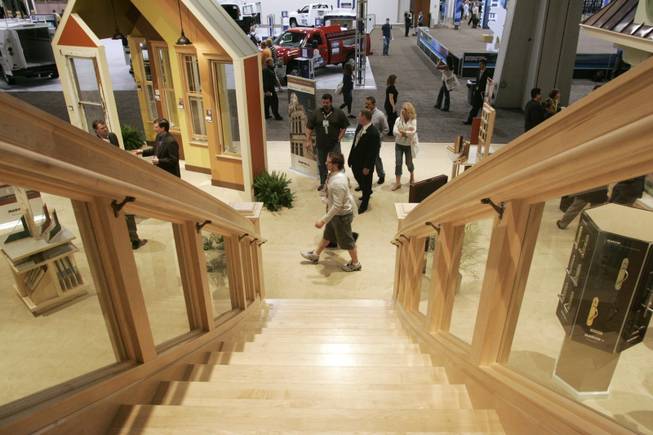
Home show: Attendees browse exhibits at the National Association of Home Builders show at the Las Vegas Convention Center on Jan. 20.
Published Friday, Jan. 23, 2009 | 2 a.m.
Updated Friday, Jan. 23, 2009 | 11:03 p.m.
Sun Archives
- Nevada remains first in foreclosures in 2008 (1-23-2009)
- A year for foreclosures (1-12-2009)
- More homes becoming negative equity casualties (1-9-2009)
- Las Vegas home prices drop to August 2003 levels (12-23-2008)
- Street-level view of the foreclosure problem (12-17-2008)
- Gibbons asks lenders for 90-day freeze on foreclosures(12-11-2008)
- Audit critical of state’s regulation of mortgage companies(12-11-2008)
- Their dreams shattered, investors left to wonder (11-28-2008)
- City works to prevent foreclosures (11-13-2008)
- City works to prevent foreclosures (11-13-2008)
- Those empty homes for sale are harming communities (10-28-2008)
- State plan could ease pressure of ‘tsunami’ (10-23-2008)
- Reid, Goodman tour foreclosed homes, present remedy (10-22-2008)
- Bill to protect renters in foreclosure cases (10-20-2008)
Sun Topics
Sun Topics
A group of economists at a national homebuilders’ conference predicted the housing market will continue to struggle in 2009, but held out hope it could stabilize by end of the year and begin a slow recovery in 2010.
But the same economists suggested it will be another two to three years before the market starts to return to any sort of normalcy.
David Berson, chief economist with PMI Group, expressed caution because economists haven’t been pessimistic enough in their forecasts.
David Crowe, chief economist with the National Association of Home Builders, said there’s a good chance the forecasts could be wrong because of the economic climate and the inexact science of forecasting.
Crowe called on the Obama administration to back its plan to help the housing market recover more quickly.
Speaking at the 2009 International Builders’ Show, Crowe applauded a stimulus package to spend more than $800 billion and help create jobs. But he said the plan falls short because its lone housing element is geared to reduce foreclosures.
Reducing foreclosures is important to keep inventory down and prices from falling, but Crowe suggested there needs to be measures to get consumers back in the marketplace. That can happen through a homebuyer’s tax credit and the buying down of interest rates, he said.
The problem with the housing market is 1.5 million more homes for sale than there is demand, Crowe said. New homes comprise about one third of that amount, and foreclosures continue to drive up the total, he said.
That continues to drive down home prices and has prompted many builders to sit on the sidelines rather than compete in that environment, he said.
Housing starts are down to their lowest level since they’ve been tracked, Crowe said. There’s no sign that will change soon because of low consumer confidence. He predicts starts will fall 29 percent in 2009 and new-home sales will fall 14 percent.
“People are afraid to go out and purchase anything major and that includes housing,” Crowe said. “ We do expect it to be a down year, but we are expecting it to trough in the middle of this year and come out on the other end of 2009 on an upswing. That upswing won’t be as strong has it has been in the past because we have a significant amount of inventory that we can’t work through in one year.”
Interest rates hovering around 5 percent are spurring interest, and there’s pent-up demand because of renewed affordability and children of Baby Boomers ready to buy their first home.
“The housing prices falling do have a positive impact on new homebuyers,” Crowe said. “Affordability is much better than it has been.”


Join the Discussion:
Check this out for a full explanation of our conversion to the LiveFyre commenting system and instructions on how to sign up for an account.
Full comments policy